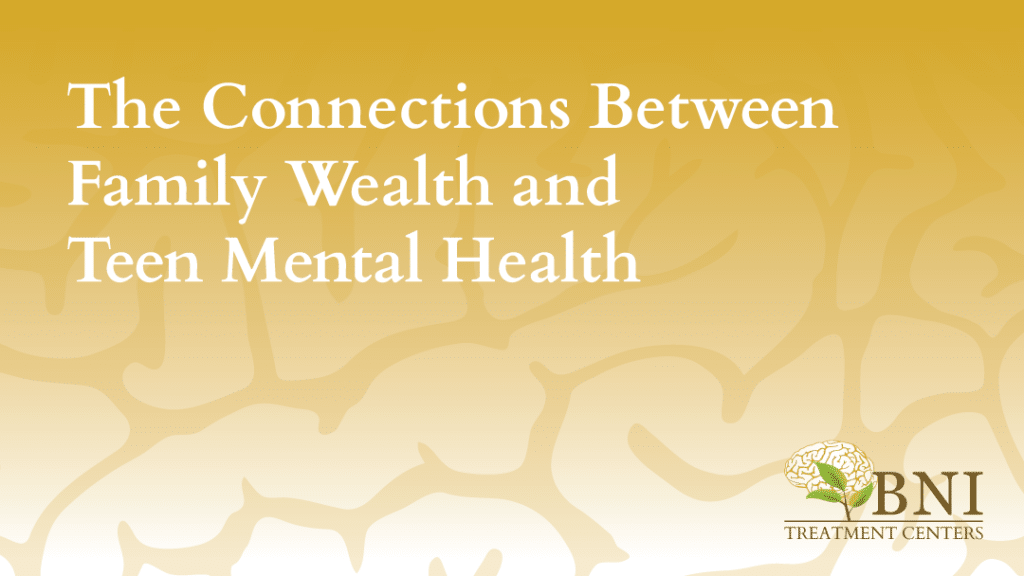Having wealth is beneficial – you are able to send your children to the best schools, feed them healthier foods, and dress them for success. …
The Connections Between Family Wealth and Teen Mental Health

Having wealth is beneficial – you are able to send your children to the best schools, feed them healthier foods, and dress them for success. However, many children raised in this environment develop depression, anxiety, and substance use disorders. These behaviors carry into adulthood, shaping their lives in unpredictable ways.
A survey conducted in 2023 showed that 31.7% of Californians experienced symptoms of anxiety and/or depressive disorders. BNI Treatment Centers sees this as a need for quality mental health care. In today’s article, we are discussing the connections between family wealth and teen mental health, the overall effects, and how they shape your child’s future.
The Connections Between Family Wealth and Teen Mental Health
For an extended period, researchers largely assumed that adolescents from affluent families were at a lower risk for developing mental health conditions and substance use disorders. However, recent studies have indicated that this demographic actually faces elevated risks due to factors such as heightened pressures to achieve and limited parental involvement. Additionally, adolescents from high socioeconomic backgrounds often experience social scrutiny from their peers, further exacerbating their vulnerability to mental health challenges.
Another study revealed that adolescents residing in affluent neighborhoods are more prone to experiencing psychosocial difficulties. Specifically, boys in these environments exhibited higher rates of delinquent behavior, while girls were more likely to experience anxiety and depression. In contrast, affluent adolescents living in middle-class neighborhoods were less affected, highlighting the significant influence of environmental context on behavioral and mental health outcomes.
Socioeconomic Status and Adolescent Well-Being
Socioeconomic status (SES) has long been recognized as a critical determinant of adolescent development and well-being. Historically, high SES was associated with protective benefits, such as better access to educational resources, healthcare, and extracurricular opportunities. However, recent research challenges this assumption, indicating that adolescents from affluent backgrounds face unique vulnerabilities that undermine their mental health and social adjustment.
High SES environments emphasize achievement and success, which imposes significant pressure on adolescents. These expectations foster perfectionism and an overreliance on external validation, leading to heightened stress and anxiety. Conversely, adolescents from low SES backgrounds frequently encounter stressors related to financial instability, limited access to resources, and exposure to adverse life experiences. While these challenges are different in nature, both high and low SES groups exhibit elevated risks for mental health disorders compared to their middle-class counterparts.
Research underscores the complexity of the relationship between SES and adolescent well-being. For example, studies have shown that adolescents in affluent communities often report higher rates of substance use, anxiety, and depression compared to their peers in middle-class privileged settings. These findings suggest that SES alone does not determine well-being but interacts with contextual and familial factors to shape adolescent outcomes.

The Role of Parental Support and Economic Stability
Parental support is a cornerstone of adolescent mental health, regardless of socioeconomic background. However, its expression and impact vary significantly across SES groups. In affluent families, parental support is often compromised by demanding work schedules or a focus on professional success, which results in emotional neglect or limited availability. Adolescents in these families might perceive their parents as distant or overly critical, fostering feelings of loneliness and inadequacy.
In low SES families, parental support is hindered by economic stressors and limited time due to multiple jobs or caregiving responsibilities. These parents face difficulties providing consistent emotional or academic support, in turn exacerbating feelings of instability and insecurity in adolescents. Despite these challenges, low SES parents frequently demonstrate resilience, utilizing community networks or extended family to fill gaps in support.
Economic stability also plays a crucial role in shaping the quality of parental involvement. Stable financial conditions enable parents to invest time and resources into their children’s education, extracurricular activities, and emotional well-being. In contrast, financial instability often redirects parental focus toward meeting basic needs, leaving less capacity for active engagement in their children’s lives. This disparity underscores the importance of targeted interventions aimed at fostering parental involvement across SES strata to mitigate adverse outcomes in adolescents.
Impact of Materialism and Emotional Distress on Teen Behavior
Materialism, a value system that prioritizes possessions and external wealth, has been linked to adverse psychological outcomes in adolescents. Studies have shown that adolescents who internalize materialistic values are more likely to experience low self-esteem, anxiety, and depression. These outcomes are particularly pronounced in high SES environments, where societal expectations and peer comparisons often amplify the emphasis on material success.
In affluent communities, adolescents equate self-worth with their ability to achieve and display material success. This mindset fosters unhealthy coping mechanisms, such as excessive competition, social comparison, or reliance on external validation. Moreover, materialistic values often detract from intrinsic motivations, such as personal growth or relationship-building, further exacerbating emotional distress.
Emotional distress among adolescents is not confined to high SES groups; it is a pervasive issue across all socioeconomic backgrounds. However, its manifestations and underlying causes differ. While materialism and achievement pressures dominate high SES environments, adolescents in low SES settings often grapple with the stress of financial insecurity, exposure to violence, or unstable living conditions. These divergent stressors highlight the need for nuanced approaches to addressing emotional distress in adolescents, tailored to their specific socioeconomic contexts.
Interventions targeting materialistic values and promoting emotional resilience are essential for mitigating the negative impact of materialism on adolescent behavior. Programs that encourage mindfulness, gratitude, and self-reflection have shown promise in helping adolescents shift their focus from external validation to internal fulfillment.
Familial Pressures of Success and Adolescent Mental Health
The drive for success, often instilled by families, has profound implications for adolescent mental health. In high SES families, success is frequently equated with academic excellence, career advancement, and social status. While these aspirations are typically motivating for adolescents to excel, they also create an environment of relentless pressure, leading to burnout, anxiety, substance use, and depression.
Adolescents from affluent families often report feeling trapped by their parents’ expectations, fearing failure or disapproval. This dynamic undermines their sense of autonomy and self-efficacy, critical components of healthy adolescent development. Furthermore, the emphasis on success discourages open communication about struggles or failures, leaving adolescents to cope with stress in isolation.
In contrast, adolescents from low SES families experience pressures related to contributing to household stability or breaking cycles of poverty. While these pressures differ from those in high SES families, they similarly place a heavy burden on adolescents, often leading to stress, guilt, or a sense of inadequacy if they perceive themselves as falling short.
Addressing familial pressures requires a balanced approach that acknowledges adolescents’ aspirations while fostering a supportive environment. Parents play a pivotal role by emphasizing effort over outcomes, encouraging open dialogue about challenges, and providing unconditional support regardless of achievement. Schools and community organizations also provide support for these efforts by promoting holistic definitions of success that prioritize well-being alongside academic or professional accomplishments.
Adolescents from affluent backgrounds often encounter challenges in establishing a sense of purpose in life. The alleviation of financial pressures through wealth and inheritance diminishes the imperative to pursue a defined career path or personal trajectory. In the absence of such direction, many teens resort to substance use as a means of coping with the existential void.

Mental Health Treatment at BNI Treatment Centers
Adolescent mental well-being is not immune because of socioeconomic status – it is actually at higher risk for depression and substance use. Getting mental health treatment is a great way to help your teen learn how to express their emotions in a healthy manner. Addressing internalizing, materialism, and stress will give them insight into their behaviors and how to manage their emotions going forward.
If you have an adolescent who is managing a mental health condition that is interfering with their life, BNI Treatment Centers is here to help. Our program combines evidence-based therapies with holistic practices, encompassing a whole-person approach to care. We also offer private and secluded accommodations, ensuring your teen’s privacy. Call us today at (888) 522-1504 to learn more about our program offerings.
BNI Treatment Centers: Science-based, evidence-backed, compassion-led.
Sources
Luthar, S.S. (2003), The Culture of Affluence: Psychological Costs of Material Wealth. Child Development, 74: 1581-1593. https://doi.org/10.1046/j.1467-8624.2003.00625.x
Lund, T.J. and Dearing, E. (2013), Is Growing Up Affluent Risky for Adolescents or Is the Problem Growing Up in an Affluent Neighborhood?. J Res Adolesc, 23: 274-282. https://doi.org/10.1111/j.1532-7795.2012.00829.x
Luthar, S. S., & Latendresse, S. J. (2005). Children of the Affluent: Challenges to Well-Being. Current Directions in Psychological Science, 14(1), 49-53. https://doi.org/10.1111/j.0963-7214.2005.00333.x
Maras, P., Moon, A., Gupta, T., & Gridley, N. (2014). The role of materialism on social, emotional and behavioural difficulties for British adolescents. Emotional and Behavioural Difficulties, 20(4), 362–380. https://doi.org/10.1080/13632752.2014.989055
Luthar, S.S. and Becker, B.E. (2002), Privileged but Pressured? A Study of Affluent Youth. Child Development, 73: 1593-1610. https://doi.org/10.1111/1467-8624.00492
Maurer, M. (2023). Well-being Processes: Insights into Personal Growth and Adolescent Mental Health. [Doctoral Thesis (compilation), Lund University]. Lund University.
About the Author

Arastou Aminzadeh, M.D.
Dr. Arastou Aminzadeh or Dr. A as most teens refer to him, has been working in variety of clinical settings for the last 20 years. He is well respected nationally for his expertise in Addiction medicine and treating adolescents. Dr. A is a triple board certified physician in psychiatry, Child and Adolescent psychiatry and Addiction medicine.

Oliver Ahmadpour, M.D.
Dr. Oliver Ahmadpour is an adult and child psychiatrist with nearly four decades of experience in the field of medicine with an M.D. degree from Sweden, where he practiced as an Internal Medicine physician. In the U.S. he completed his Post-Doctoral Fellowship in Endocrinology at UCSD, and his Residency and Fellowship in Adult, Child, and adolescent Psychiatry at USC Keck School of Medicine.
Free Insurance Verification
News & Resources for Families
Check Out Our Recent Articles
Frequently Asked Questions
We treat a wide range of teen mental health challenges including anxiety, depression, bipolar disorder, OCD, trauma-related disorders, behavioral issues, ADHD, oppositional defiance, substance use, and dual-diagnosis conditions. Many families come to BNI after struggling to find the right level of care elsewhere.
Most private insurance plans cover a significant portion of treatment. Our admissions team verifies benefits quickly and explains coverage, deductibles, and out-of-pocket expectations before admission. We do not accept Medi-Cal or Medicare.
Yes. Many families come to BNI with teens who have complex diagnoses, treatment-resistant depression, severe anxiety, self-harm history, or previous hospitalizations. Our clinical leadership regularly treats high-acuity cases and provides specialized expertise for them.
Absolutely. We use established, research-backed modalities including CBT, DBT, trauma-informed care, psychiatric medication management, experiential therapies, family systems work, and integrative approaches such as mindfulness, yoga, and expressive arts.
Our residential and outpatient programs are located in private, secure homes in Agoura Hills and Calabasas. These areas are known for their safety, privacy, and access to nature—ideal for focused healing and recovery.
Yes. BNI is trusted by the UCLA David Geffen School of Medicine as a training rotation site for physician fellows to learn best practices in adolescent mental health—an acknowledgment of our clinical quality and leadership in teen psychiatry.
What We Treat
Primary Mental Health

Primary Mental Health
Behavioral Issues

Behavioral Issues
Dual-Diagnosis




